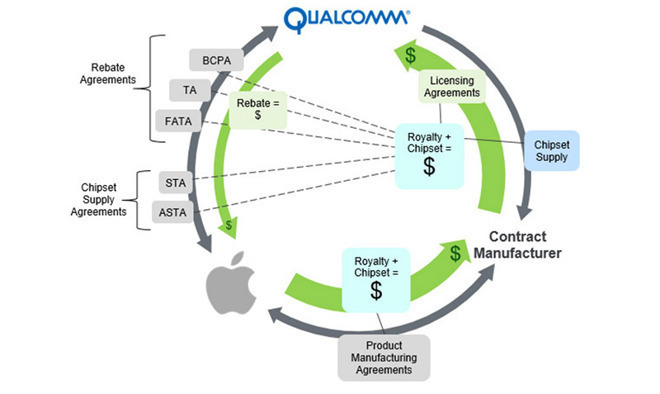As part of an ongoing patent licensing dispute with Apple, Qualcomm on Wednesday requested a court order stipulating that Apple contract manufacturers maintain royalty payments during the legal process.
News of the court request arrives from Axios, which obtained a statement on today's proceedings from Qualcomm's general counsel Don Rosenberg.
"We are confident that our contracts will be found valid and enforceable but in the interim it is only fair and equitable that our licensees pay for the property they are using," Rosenberg said.
Last month, Qualcomm revealed an unspecified number of contract manufacturers using Qualcomm IP to build hardware bound for Apple products were withholding royalty payments. Certain suppliers continue to underpay royalties in amounts equal to those Qualcomm had not paid Apple under previously arranged licensing rebate deals.
In a lawsuit leveled in January, Apple accused Qualcomm of unfair licensing terms, saying the firm withheld nearly $1 billion in rebates in retaliation for participating in a South Korean antitrust investigation.
At the heart of Apple's suit are claims against Qualcomm's business practices, which the iPhone maker describes as monopolistic. Apple alleges Qualcomm abuses its "monopoly power" of the mobile wireless chip market to flout FRAND (fair, reasonable and nondiscriminatory) patent commitments to charge customers exorbitant royalty rates on standard-essential patents. Qualcomm also restricts sales to buyers who have agreed to license its SEPs, a practice Apple refers to as "double-dipping."
Those accusations mirror certain claims addressed in a U.S. Federal Trade Commission antitrust lawsuit also lodged in January.
For its part, Qualcomm claims Apple is interfering with its contract manufacturers, and to that end filed an amended counterclaim on Wednesday that provides further evidence of such tampering. Qualcomm initially outlined its case in a countersuit in April.
Along with allegations relating to hardware suppliers, Qualcomm asserts Apple is in breach of contract and has in the past wrongly induced regulatory action in a number of jurisdictions. The original counterclaim cited 35 specific defenses to Apple's January allegations. Qualcomm asserts that Apple has not suffered tangible injury, antitrust or otherwise, from Qualcomm's business practices.
 AppleInsider Staff
AppleInsider Staff







-m.jpg)






 Charles Martin
Charles Martin
 Christine McKee
Christine McKee
 Wesley Hilliard
Wesley Hilliard
 Malcolm Owen
Malcolm Owen
 Andrew Orr
Andrew Orr
 William Gallagher
William Gallagher
 Sponsored Content
Sponsored Content








14 Comments
The reduction in cash flow must hurt.
They could offer to put the money in escrow pending the outcome of the case.
That seems to be acceptable in many cases.